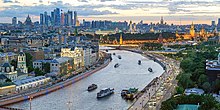Portal:Business/Selected economy/31
The economy of Russia has gradually transformed from a planned economy into a mixed market-oriented economy. It has enormous natural resources, particularly oil and natural gas. In 2023, it was the world's 11th-largest economy by nominal GDP, 6th-largest by purchasing power parity (PPP) according to IMF, and 5th-largest according to World Bank. Due to a volatile currency exchange rate, Russia's GDP as measured in dollars fluctuates sharply. Russia was the last major economy to join the WTO, becoming a member in 2012.
Russia's vast geography is an important determinant of its economic activity, with the country holding a large share of the world's natural resources. It has been widely described as an energy superpower; as it has the world's largest natural gas reserves, 2nd-largest coal reserves, 8th-largest oil reserves, and the largest oil shale reserves in Europe. It is the world's leading natural gas exporter, the 2nd-largest natural gas producer, the 2nd-largest oil exporter and producer and third largest coal exporter. Russia's foreign exchange reserves are the world's 4th-largest. It has a labour force of roughly 70 million people, which is the world's 7th-largest. Russia is the world's 3rd-largest exporter of arms. The oil and gas sector accounted up to roughly 34% of Russia's federal budget revenues, and up to 54% of its exports in 2021. Russia has the world's 5th-largest number of billionaires. Russia's inequality of household income and wealth remains comparatively high, with a Gini coefficient of 36 in 2020 as compared to 39.8 in the US in 2021. (Full article...)

